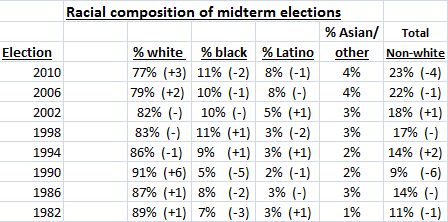 |
| Reid photo courtesy of A.P. |
Throughout the 2012 Presidential election, the likely racial make-up of voters who would make an appearance at the polls on election night was a source of intense debate among pollsters and the media.
Republicans hypothesized the Obama camp would be unable to replicate the record-breaking minority turnout they generated four years earlier, when Obama became the first Democratic President since Jimmy Carter in 1976 to win a majority of the popular vote (and by a much larger margin than Jimmy). Democrats believed their GOTV operation was top-notch and superior to Team Romney's; besides, white voters as a percentage of the electorate had dropped in every presidential election since 1992, while minority voters have been on the rise.
In the end, Republicans were right on one thing, but dead-wrong on everything else. Obama indeed failed to match his 2008 near-landslide defeat of John McCain with Mitt Romney...but he won anyway, and Republicans lost the demographic-debate battle. Not only did minority voters match their turnout numbers from four years earlier, they exceeded it.
Even worse for the GOP, a near-impossible to deny trend in presidential demographics was further confirmed last November- namely, that whites have dropped as a percentage of the electorate in every presidential election since 1992, while non-white voters have increased.
Fortunately for Republicans, the next election will not be a presidential one.
But does the news really get better for the GOP just by virtue of the fact that the upcoming election is a midterm? What, if anything, do these presidential trends tell us about what we can expect one year and a half from now?
Well, if midterm demographics follow the same pattern presidential demographics followed in 2012, they tell us a good bit.
The chart below compiles racial turnout numbers for every midterm election since 1982:
 |
| Number in parentheses represents the % change from the preceding presidential election. Information courtesy of Best and Krueger's Exit Polls; Surveying the American Electorate, 1972-2010. |
Several pieces of data from the chart stand out.
First of all, it's true what they say: midterm elections do indeed tend to involve a more white, less minority electorate than presidential elections. There's only been one exception, and that was in 1994 oddly enough (the year of the GOP takeover and Gingrich's Contract with America). But more often than not, the trend has been that the white vote increases as a percentage of the entire electorate in midterms, as compared to the previous presidential election. For example the 2010 midterm electorate was 3 points MORE white (77%) than the 2008 presidential election (74%).
Also noteworthy in the chart above is the fact that the percentage of white and non-white voters as a share of the electorate follows the same trend as that of presidential elections: white vote share has decreased in every midterm since 1990 (91% to 77% in 2010), while the non-white share has increased since 1990 (9% to 23% in 2010).
But Republicans need not despair over this fact. They managed a remarkably strong performance in 2010, DESPITE the fact that minority voters made up a midterm-high of 23%, while whites made up a midterm-low of 77% of voters.
And it's very important to remember that margins matter.
What I mean by that is this - Republicans had such a great year in 2010, not necessarily because of demographics (again, white voters made up a midterm historical low of 77%), but because of the margin they ran up against the Democrats among whites. The GOP defeated Democrats on election night among white voters 60-37%, the largest margin in midterm exit poll history. See the chart below:
On the other hand, in 2006, when Democrats won the House popular vote 53-42%, Republicans barely carried whites (51-47%).
In any case, based on the above chart, it wouldn't be a stretch to say that Republicans will probably win the white vote in the 2014 election. But like the 2012 Presidential election, that fact alone won't be enough. Margin is everything. And based on the current state of generic house ballot polling, Republicans aren't performing well enough with their demographic base to prevent House losses.
The chart below documents both the overall result of every 2014 generic house ballot survey taken since the 2012 election, as well as the result among white and non-white voters:
Early polling thus far only gives the GOP an average 11 point lead over the Democrats among white voters, with an average of 73% of poll respondents being white (72% identified as white in the 2012 presidential election), and 26% identifying as non-white (it was 28% in 2012).
Though the lead with whites is significant, the GOP still trails Democrats by an average 44-40%. But even if the polling averages reflected an electorate identical to 2010 (77% white, 23% non-white), Republicans would still trail Democrats on the generic 2014 House ballot 43-41%.
To sum it all up, it IS true when you hear people say that midterm elections tend to feature higher white and lower non-white turnout than presidential elections. While this is a plus for Republicans, it is also true that each midterm election since 1990 has featured less white and more non-white voters than the previous midterm, which is obviously a plus for Democrats.
The one true coin toss regarding the 2014 elections pertains to the margin by which Republicans win whites, and Democrats win non-whites. That's something that no trend or pattern can dictate, and depends solely upon the political climate we're dealing with on election day 18 months from now. But unless demographics start to tilt more favorably towards the GOP, they'll need to win more than 11% of white voters to avoid losses in the House.



No comments:
Post a Comment
Note: Only a member of this blog may post a comment.